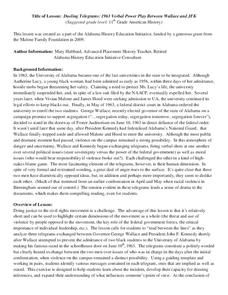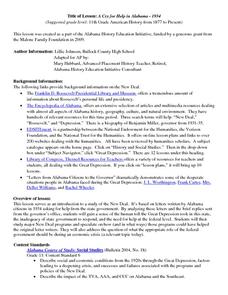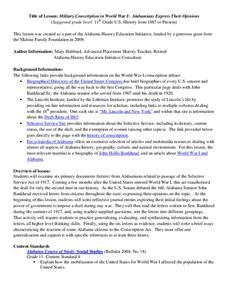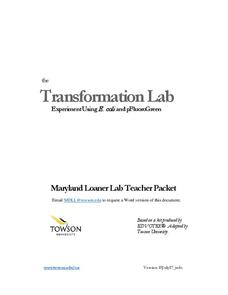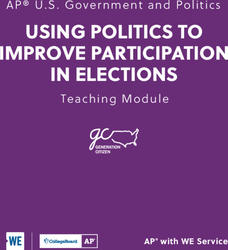Ms. Effie's Lifesavers
Ralph Ellison’s Invisible Man in the Spotlight
Ralph Ellison's Invisible Man is the most frequently cited novel for the Advanced Placement Literature and Composition Open Response Question. Those new to using the book and and veterans as well will find the teaching strategies, the...
College Board
Civic Knowledge and Action in AP U.S. Government and Politics
Vote, it's your civic duty! The high school lesson focuses on voter turnout and civic participation with a series of activities. Young scholars analyze data to discover voter turnout trends, complete worksheets, and participate in group...
American Press Institute
Newspapers in Your Life: What’s News Where?
Big news isn't necessarily newsworthy everywhere! How do journalists decide what to cover with so much happening around them? A instructional activity on media literacy examines the factors that affect the media's choice of stories to...
Smarter Balanced
Uncommon Animals
Need to prepare for a performance task assessment on the topic of uncommon animals? Here's an activity that ensures all learners have the knowledge of key terms and concepts to approach the assessment.
Curated OER
Debates on Persuasive Language That Extend Outside of Class
There is no better sight to see than a classroom full of eager young adults, hands raised high, eager to jump into a class discussion. Get your class identifying and discussing rhetorical strategies and then debating long into the night...
Alabama Department of Archives and History
Dueling Telegrams: 1963 Verbal Power Play Between Wallace and JFK
Information, inferences, and innuendos. Text and subtext. Class members examine telegrams exchanged between President John F. Kennedy and Alabama Governor George Wallace, studying both what is stated and what is implied by the...
Curated OER
Chemical Consequences of Burning Fossil Fuels
Future scientists are introduced to the chemical consequences of burning fossil fuels, learning that fossil fuel combustion leads to the formation of oxides of three nonmetals: carbon, nitrogen, and sulfur, all of which end up in the...
Alabama Department of Archives and History
Alabama's Secession in 1861: Embraced with Joy and Great Confidence. Why?
From December 20, 1860 to June 8, 1861, eleven states seceded from the Union. Alabama seceded on January 11, 1861. Why did so many white Alabamians want to secede? Why did they believe the South could win the war? These are the essential...
Alabama Department of Archives and History
The Wrong Side of History: How One Group Justified Its Opposition on the Freedom Riders and Civil Rights for African Americans
Designed as a supplement to the study of the Freedom Riders, this resource uses primary sources to reveal the views of those who opposed the Freedom Riders. After careful study of the arguments presented by the members of the Montgomery...
Alabama Department of Archives and History
What Were They Thinking? Why Some Some Alabamians Opposed the 19th Amendment
To better understand the debate over the 19th Amendment, class members examine two primary source documents that reveal some of the social, economic, racial, and political realities of the time period.
College Board
AP® Psychology Cognition and Language
I can remember what happened five years ago, but I can't recall what I did last week! High school psychology students analyze how memory, cognition, and language impact one another. Hands-on activities, memory exercises, and research...
Alabama Department of Archives and History
Conflict in Alabama in the 1830s: Native Americans, Settlers, and Government
To better understand the Indian Removal Act of 1830, class members examine primary source documents including letters written by Alabama governors and the Cherokee chiefs. The instructional activity is part of a unit on the expansion of...
Curated OER
EU Simulation: The European Council
Discover how government and the European Union works with this interactive activity. Small groups form to represent a country and create a profile. The instructor presents an issue to discuss and potential politicians then develop...
Alabama Department of Archives and History
A Cry for Help in Alabama - 1934
What should be the role of the federal government during an economic crisis? That is the question at the center of this introduction to a study of the New Deal. Class members examine letters to the state government asking for help,...
Alabama Department of Archives and History
Alabama's 1901 Constitution: What Was at Stake?
Who should be able to vote? As part of a study of the 1901 Alabama Constitution, class members examine primary source document that reveal the reasons the authors gave to support their positions on this question and their assumptions in...
Alabama Department of Archives and History
America in Space: German Voices from Huntsville, Alabama
Project Paperclip, the Redstone Arsenal, and the Huntsville Space Center are all featured in a resource that investigates the contributions of Dr. Werner von Brawn and other German scientists to the US space program....
Alabama Department of Archives and History
Camp Aliceville: The Story of WWII Prisoners of War Who Came to Alabama
POW camps in the United states? In Alabama? The German POW camp in Aliceville, Alabama is used as the focus of a study of the more than 700 camps built in the US during World War II.
Alabama Department of Archives and History
Convict Leasing in Alabama: a System That Re-Enslaved Blacks After the Civil War
The post-Civil War convict leasing program, rarely covered in textbooks, is the focus of a lesson that asks class members to use information drawn from primary source documents to assess the program. While the focus is on Alabama's...
Alabama Department of Archives and History
Military Conscription in World War I: Alabamians Express Their Opinions
If called, would you go? Should the US government have the power to impose a draft during any war? The Selective Service Act of 1917 (aka the Conscription Act of 1917) authorized the drafting of men into the military for only the...
EngageNY
Chance Experiments
Class members are introduced to probability using terms such as impossible, unlikely, likely, and certain. Numbers between zero and one are associated with the descriptions of probability. Pupils find the likelihood of chance experiments...
Towson University
Transformation Lab
Transform your class' understanding of genes and antibiotic resistance with the Transformation Lab. Junior geneticists create and observe their own resistant strains of E. coli through research, discussion, and experimentation. The...
Kenan Fellows
Qualitative Kinetics: Examining the Effect of an Enzyme on a Reaction
Scholars learn about kinetics and buffers as they use qualitative and quantitative methods to understand enzyme rates and buffer capacity. The application of Beer's Law and spectrophotometry solidifies pupils' knowledge in the first of...
College Board
AP® Psychology: Teaching Statistics and Research Methodology
Psychologists use statistics? Scholars investigate the research behind the methodology of statistical analysis. Using hands-on practice, case-studies, and scatterplots, they complete various tasks to understand the very roots of high...
College Board
Using Politics to Improve Participation in Elections
Instructors new to teaching AP U.S. Government and Politics classes, as well as seasoned veterans, will find this teaching guide an invaluable resource. Using a project-based approach to civics education, the lessons emphasize real-world...
Other popular searches
- Advanced Placement Physics
- Advanced Placement English
- Advanced Placement Writing
- Advanced Placement Art
- Advanced Placement + English





